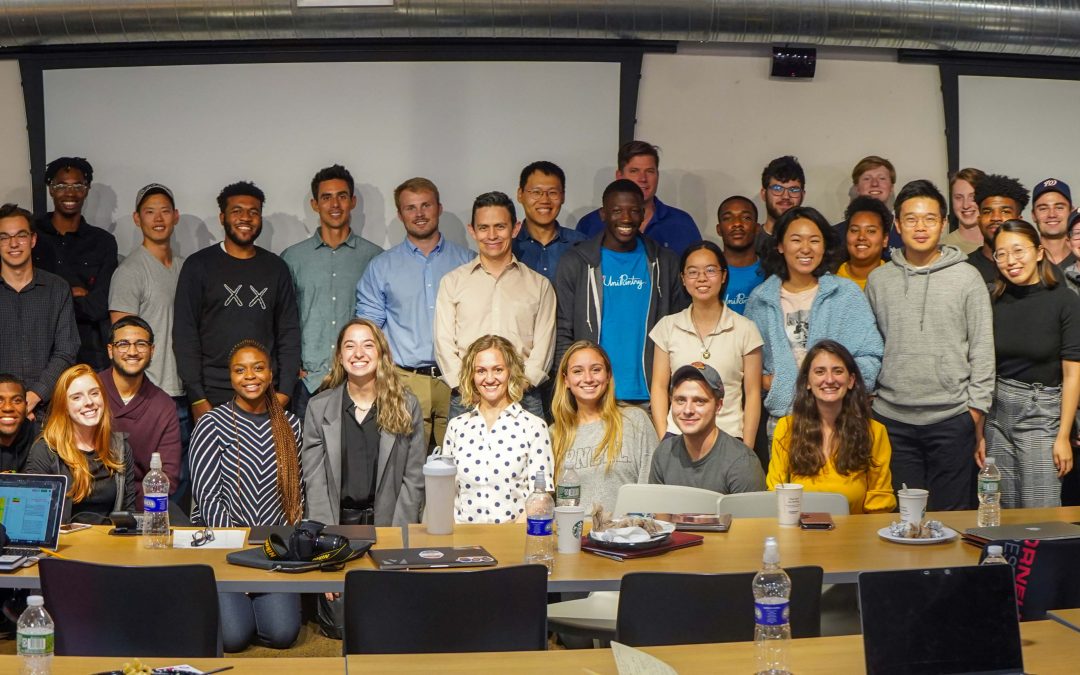Cornell’s accelerator for student startups, eLab, recently accepted its 2019-20 cohort of 24 businesses, the most in its history. The for-credit program, which received a record number of applications, puts startups through a rigorous nine-month process of refining their ideas, while preparing them to launch companies.
“The quality of the applicants for the eLab student startup program is unparalleled,” said Ken Rother, eLab’s managing director, “The eLab program is highly selective, focusing on students who have already dedicated significant amounts of time and effort pursuing an entrepreneurial concept. With more and more students leveraging an ever-expanding suite of entrepreneurship resources at Cornell, this year’s talented pool of eLab applicants made the selection process that much more difficult.
“We had to make the cohort larger,” he said, “there were too many qualified applicants with unique business ideas and the tenacity needed to succeed in the startup world.”
The eLab program assists student startups with refining and improving their entrepreneurial ideas. Programming at the start of the course focuses on customer discovery – the process of determining product market fit. During this time, students meet regularly with eLab instructors, engage with eLab alumni and interview dozens of potential customers.
As the course progresses, eLab students are mentored by experienced entrepreneurs to refine their business plans and identify strategies for securing funding and launching their startups.
Established in 2008 by Student Agencies Foundation and Entrepreneurship at Cornell, the eLab program has produced many successful startups – from recent graduates to more experienced alumni. A 2019 eLab alumnus, food science startup Antithesis, recently received a National Science Foundation Small Business Innovation Research Phase I award to develop its flagship chickpea-based snack food, Grabanzos.
This year’s eLab cohort and their founders:
- BLU Media is a community development platform for empowering students of color. Grace Okunubi ’22; Jalil Evans ’21; Laurence Minter ’21; Dami Odunowo ’21; and Rami Abdou ’20.
- CoD Agent is building a platform for Call of Duty esports athletes to practice and compete at any level. Shane Thorsteinson ’22; and Brett O’Connor ’21.
- FanDOME enables teams and leagues to better and more directly engage fans using social influence and spend insights derived from competing over their rank. Steven Kaye, MBA ’20; Josh Tanenbaum, MBA ’20; Yale Viny, MBA ’20; and Jean Turban ’20.
- Geometrie helps women find professional clothing that fits. Cecelia McDonald, MBA ’20; Alyssa Mizell, MBA ’20; Shivani Parmarm, MHA ’20; and Nicole Hu ’22.
- Glassgrab is a platform for buying and selling art glass. Gary Perelberg ’22; and Adam Schur ’21.
- Ivy Online Academics is an education startup that provides opportunities for Chinese high school students to join online research programs offered by top-ranked colleges and universities in the United States. Mi Yan, M.S. ’20; Yue Li, Ph.D. ’17; and Melanie Santiago.
- Le Fay Laundry Care is developing a mosquito repelling laundry additive. Nicole Garcia ’21; and Christopher Braden Koszarsky ’19.
- Looē is dedicated to helping women manage the safety and quality of their pumped breast milk. Sarah Reyes, Ph.D. ’19; Paul Reyes; and Kelly Hulse.
- Pedicure is a medical device to assist the elderly in toenail grooming. Jialin Ke ’20; Jessica Tao ’20; Joshua Zhu ’20; and Jonathan Pao ’19.
- Qubit removes the distance and noise barrier between football coaches and players. Shanee Lu ’20; and Younan Lu.
- SmartScene is a solution for tracking and predicting motion of people and objects in real time. Jake Gemerek, Ph.D. ’20.
- Spark Pop is a guilt-free candy for in-office cravings. Delia Hughes ’20; Meagan McKeever ’14; and Lindsay Simon ’14.
- Sprout is a pediatric behavioral telehealth platform. Nicole Beck, MBA ’20; Marla Beyer, MBA ’20; and Kelcie Lee, MBA ’20.
- Sway the Vote uses science to empower a generation of college students, enabling them to register and vote where and when it matters most. Juliana Bain ’20; and Lauren Goldstein ’20.
- Takk is a data-driven phonathon solution that helps higher education institutions maximize financial gifts from alumni, parents and fans. Iliana Paleva, M.S. ’20; Andrew Chen ’22; Oishani Ganguly ’22; Jason Huang ’21; Jacob Bee Ho Brown ’20; Jiayi Chen ’20; and Andrew Gao ’19.
- The Scholar Coin helps students finance higher education and secure student funding with a curriculum and mentor-matching platform. Maya Mundell, Ph.D. ’23.
- This Is My Spacesuit is an educational fashion brand that uses space and wearable technology to make fashion designs more accessible. Shoshana Swell ’20.
- UniPantry is a discounted e-commerce platform for students by students. Tasha Mok ’21; Josiah Covington ’20; Nia Khann ’20; and Moussa Paye ’19.
- VeriBuy is an online marketplace to guarantee authentic merchandise. Brandon Womack ’20; and Milik Dawkins ’20.
- Vincurian offers a personalized wine shopping experience for customers seeking to explore wines beyond their routine brands through a tasting room and online store with same-day delivery. Julia Eklund, MBA ’20; and Alexander Littauer, MBA ’20.
- Voxel is developing technology capable of filtering carcinogens from substances to ensure purity, which could be applicable to CBD manufacturers that desire to remove THC from their products. Jen-Yu Huang, Ph.D. ’21.
- Wize is a digital financial education service platform to empower those that struggle financially to take control of their personal finances. Jehron Petty ’20; James Seaton ’19; Tocorey Oughterson; and Liana Dominique.
- WOAH! Brands is producing a CBD-infused sparkling water that provides calm and focus for caffeine drinkers who experience a midafternoon coffee crash. Mike Wagner, MBA ’20; and Moses Oh, MBA ’20.
- Zing helps professors build classroom community and engagement by connecting students to their classmates. Alisa Lai ’22; Jordyn Goldzweig ’21; and Sam Brickman ’21.
Participants will pitch their business ideas at the eLab NYC Pitch Night Nov. 7. The event is structured to connect eLab startups with prospective advisers and future mentors.
This article was originally published in the Cornell Chronicle.

